If your e-bike battery is depleting faster than expected, common causes include battery aging, environmental factors such as temperature and terrain, insufficient maintenance, or energy-demanding riding practices
Fortunately, you don't always have to get a new battery. Properly identifying what is causing your battery to drain too quickly will help you mitigate the problem and maybe save you some more years of battery life. In some cases, however, you need a new bike battery.
So, what is causing your battery to drain too quickly? Here are five reasons.
1. The Ebike Battery is Getting Old
If your ebike battery is draining too quickly, it is likely due to the natural degradation in quality that happens as ebike batteries age. Ebike batteries start to degrade once they have reached about 500 cycles, and/or have been used for about 3 years.
- After about 500 cycles, many batteries can only hold around 70–80% of their original capacity.
- Lithium-ion batteries may last up to 3-5 years, but they start to wear out after about 2-3 years.
How Ebike Batteries Cycles Work
Every ebike battery is rated for a fixed number of charge cycles (usually 500–1,000 full cycles). A cycle means one full discharge and recharge, but partial charges still count toward the total over time.
- Generally, the more cycles you have used, the less your ebike battery can hold a charge.
- So, if your bike battery is dying quickly, it may be because it is approaching the 500-cycle mark, which means it can hold around 70–80% of its original capacity.
How Batteries Degrade Naturally Over Time
Ebike batteries are made of lithium-ion, which is very high in chemical activity. Here’s why a lithium-ion battery will start draining quickly in about 2-3 years:
- The chemical processes going on the batteries slow down,
- and the capacity of the battery (to hold charge) reduces noticeably.
The battery will not stop working entirely, but its ability to hold a charge will drop. If your bike is a few years old and you’ve been riding regularly, some of that “lost range” could simply be age catching up.
- If you are a performance-driven biker whose battery is over 3 years old and has started dying too fast, it may be time to replace your e-bike battery.
- If you are a regular rider, you can continue using the bike. The battery will last many more years, but will not be as good as before.
2. You are Riding In Rough/ Challenging Conditions
If your battery is draining too quickly, it may be because you are riding on hills, through headwinds, rough trails, and stop-and-go traffic. These conditions demand more from your motor, which will, in turn, pull extra power from the battery.
- When you are riding uphill, your ebike requires extra torque, so the motor pulls more current from the battery. Consistently riding uphill will overexert your battery and cause it to start dying faster.
- When you ride on rough trails, the rocks, roots, and uneven surfaces make the wheels work harder, and you also use more pedal assist, both of which drain the battery quickly.
- In stop-and-go traffic, the stop-and-go motion consumes more energy than steady riding.
So, use lower pedal assist, keep your tires properly inflated, and plan your route to avoid steep hills and rough trails as much as possible.
Recommended Mountain Bike for Rough Conditions
Mountain bikes are designed for rougher terrain and more challenging trails, and so have stronger batteries. Consider the Panther Electric Mountain Bike . It comes with a 350W brushless gear motor, a 48V 10.4Ah high-tech lithium battery that lasts for 20 miles per charge, and a smooth 21-speed Shimano transmission.
3. You are Using Too Much Pedal Assist
If you are constantly riding on high pedal assist levels, then your ebike battery will drain a lot faster. The higher the pedal assist you use, the more work the motor does, and the faster your bike battery drains. If you are constantly riding in Pedal Assist level 5, your bike will go faster, but the battery may become overexerted in the long run.
The BZ1 Step-Thru Electric Bike , for example, has 5 levels of pedal assist that use 60/70/80/90/100% of max speed, respectively. To economize battery usage, you can switch to lower levels of pedal assist for longer rides and better battery preservation.
The battery gives you 45 thrilling miles of battery power for pedal-assisted journeys and 25 miles for pure electric. When you need to recharge the battery, you can pop it out and in again easily.
4. You Are Ignoring Bike Maintenance
If certain components of your bike, like the tires, brakes, and chain, are not properly maintained, the battery drains faster, leading to lower battery life. Improperly maintained components cause the motor to work harder, which in turn puts extra pressure on the battery. Here’s how it works:
- Under-inflated tires. The motor has to work harder against extra rolling resistance, which drains the battery quickly.
- Dragging brakes create constant resistance. The motor must use more power to keep the bike moving, which drains the battery faster per ride
- A dry, dirty chain increases friction in the drivetrain, making the motor work harder.
In particular, pay sufficient attention to how to clean, tighten, and fix a bike chain.
6. You are Not Storing The Battery Properly
If your bike battery is wearing out too quickly, it may also be because you are storing it in a location that is too hot or too cold. Lithium-ion batteries are picky about temperature:
- Cold weather (below 0°C / 32°F) slows their chemical reactions, reducing their capacity
- Extreme heat (35–40°C / 95–104°F) can cause stress and permanent damage.
The best storage temperature for your ebike battery is in a cool, dry place around 15–25°C / 59–77°F.
- To be safe, do not store your ebike battery in a freezing garage, a cold shed, or even a car ( in the winter).
- Also, avoid storing an ebike battery in a parked car in summer, a hot attic, direct sunlight, or near a heater.
Safe vs Unsafe Spots for Storing an E-bike Battery
| Safe Storage Spots | Unsafe Storage Spots |
| Inside your home at room temperature (59–77°F / 15–25°C) | Parked car (can exceed 122°F / 50°C in summer) |
| Closet or cabinet away from sunlight | Unheated garage or shed in freezing winters |
| Cool, dry basement (not damp) | Attic (can get very hot in summer) |
| Temperature-controlled garage or workshop | Near heaters, stoves, or radiators |
| Protective battery case for insulation | Direct sunlight for long periods |
| Damp areas (risk of corrosion/short circuits) |
Consider these 10 bike storage ideas for your bike or trike.
6. You Are Not Charging The Battery Properly
Your Ebike battery may also be draining too quickly because you don't understand when and how to charge it. When you charge your battery matters: the following ebike battery charging mistakes will reduce the capacity and lifespan of your battery:
- Letting it drop to 0% before charging
- Overcharging it for long periods, even after it has reached 100%.
Ideally, keep your battery between 20% and 80% most of the time, and avoid leaving it on the charger overnight. Explore more details on how to charge your
Conclusion
The good news is that most of these issues can be prevented or corrected with proper care. Regularly charging your battery, avoiding extreme temperatures, keeping your tires inflated, and maintaining a clean, well-lubricated drivetrain can make a big difference in battery performance.
Consider these tips for pumping your ebike tire, and explore more ebike maintenance tips to preserve your bike battery.




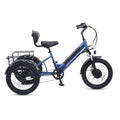
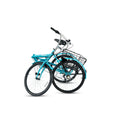
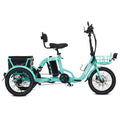

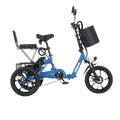






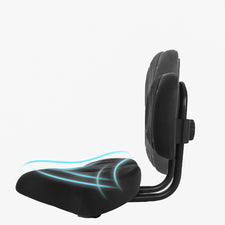





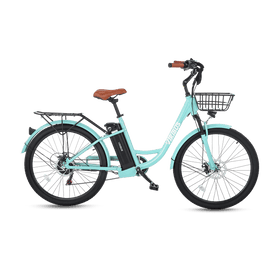
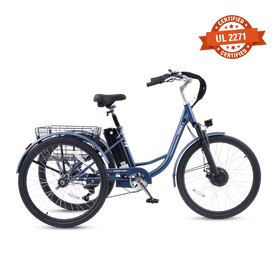
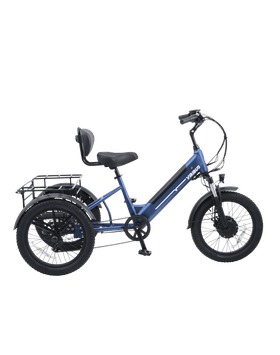




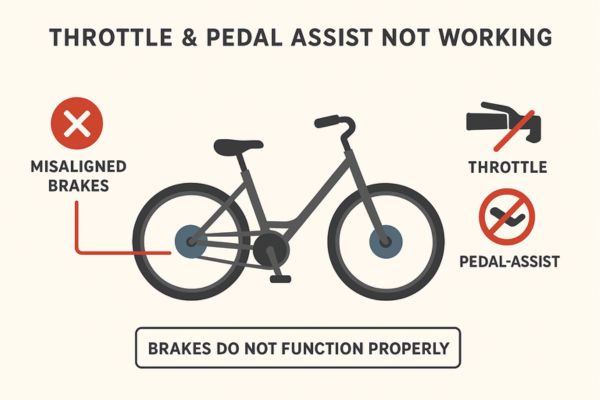
Leave a comment
All comments are moderated before being published.
This site is protected by hCaptcha and the hCaptcha Privacy Policy and Terms of Service apply.